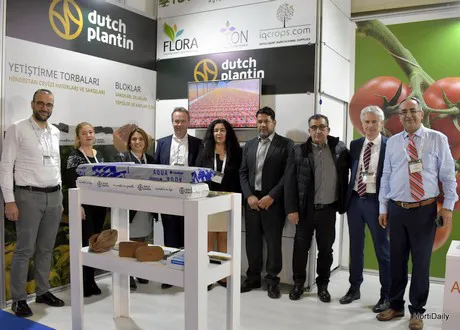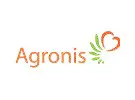Turkey is one of the largest countries in the world when it comes to horticulture, around 80,000 hectares of greenhouses are spread across the nation. But only a very small part of this area is dedicated to high-tech growing, and it’s getting increasingly difficult for low-tech growers to keep up with the demands of the market. Agronis is looking to change this by offering low-tech growers the opportunity to slowly adopt high-tech solutions. Mrs. Zarif Coskun with Agronis: “Our role is to offer these growers affordable solutions, small steps in the direction of more high-tech solutions.”
The more traditional farmers of Turkey and the surrounding countries are ready to make a change, and show great interest in hydroponics. “At the Growtech in Antalya I was pleasantly surprised by the interest from traditional farmers to get into hydroponics,” says Zarif. “Lettuce, strawberry, and cucumber growers from Turkey, the Middle-East and Turkmenistan showed a lot of interest.”

A big gap
According to Zarif, there is a big gap between low- and high tech industry in Turkey. “Low-tech, more traditional growers, grow with low-tech irrigation and low-tech greenhouses,” she says. “There is no automation. But now it’s becoming more difficult to earn money like this, because they are growing in soil – in a lot of situations this is the same soil that has been used for 50 years, and so it’s not fertile anymore.”
But fertility is not the only problem with the soil. “It’s full of diseases like nematodes and fusarium,” Zarif says. “Because of this growers have to apply a lot of chemicals to the soil to keep their crops healthy, but the costs of this is high. On top of that there are quality checks that look for chemical residues in the crops, because consumers don’t want that.”
For these various reasons it is becoming increasingly interesting for these growers to look at hydroponics. “The cost of keeping the crops healthy in soil is more or less similar to the cost of substrate, and hydroponics has no soil related diseases – it is a relatively clean way of growing,” says Zarif. “On top of that you reduce the amount of water and fertilizer you use when growing in substrate. And water especially is a resource that we have to take care of, because in 15-20 years water will be a big issue.”
Still the costs of high-tech greenhouses are too high for growers to just make the change, especially smaller growers with 1 to 1.5 hectare of field cannot make such a big investment lightly. “This is where Agronis comes in,” says Zarif. “We offer these growers an affordable solution, by helping them take the first steps into hydroponics with lower costs. We help them invest in the right technology for irrigation and substrate, which for them means: less diseases, less water, and less fertilizer – so higher quality crops for lower cost.”
One of the first agreements the company made therefore was with Dutch Plantin, supplier of coco pith. Dutch Plantin is a well known coco pith manufacturer and supplier of bags, pots and various products. "The aim of the partnership is to build and grow a sustainable business in the area. We both believe in the hydroponic growing is the future in the region. Decreasing resources of raw materials like water and fertilizers, lack of human power and the demand for more efficient growing techniques to create more healthy and more quality vegetables will enable the business develop in further means", Wim Roosen with Dutch Plantin explains.
Changes in the market
In Turkey there is an increasing demand for higher quality produce coming from metropolitan areas like Ankara and Istanbul. “There is a growing middle class, and these white collar workers are increasingly looking for good quality produce,” says Zarif. “They don’t have time to go to the market and inspect the vegetables before purchase, they want to go to the supermarket and pick up good quality produce there. So there is a need to increase the quality of produce that growers are delivering to meet the demand of the market.”
Working with smaller growers
Zarif has a special reason for wanting to help smaller growers establish themselves better in the market. “I am a 4th generation farmer’s daughter, and I know these farmers by heart,” she says. “When my children were born I stopped working on the farm, but now that they are grown up I am ready to take back the lead from my husband and put my all into giving back to the industry.”
So Agronis tries to work with the average farmer, not the high tech businesses. “These smaller farms are often family businesses, and we care about offering these people a reliable and affordable solution,” Zarif says. “These growers understand you and are willing to work with you. The more high-tech growers often feel more like corporations, these smaller companies feel like families.”
Zarif continues: “I am also looking to empower women growers specifically, because we absolutely need to have more ladies in the field. We are also looking to expand this strategy to Bahrein, Qatar, and the Emirates as well.”
Issues
One of the biggest issues that Zarif faces is trust. “Working with smaller growers often also means that you are working with people that are less willing to take risks,” she says. “These are brand new steps for growers that have perhaps been growing like this for generations, and this is their livelihood they are putting at risk. They are scared that what we offer could not possibly be as good as we promise, but this fear disappears as soon as they see the results.”
For more information: Agronis Horticultural Solutions & Supplies
Agronis Horticultural Solutions & Supplies
Yesilova M. Aspendos Bul. Hayriye Alp Apt.
No:210, Antalya, TURKIYE 07070
info@agronis.com.tr
www.agronis.com.tr
 Dutch Plantin
Dutch Plantin